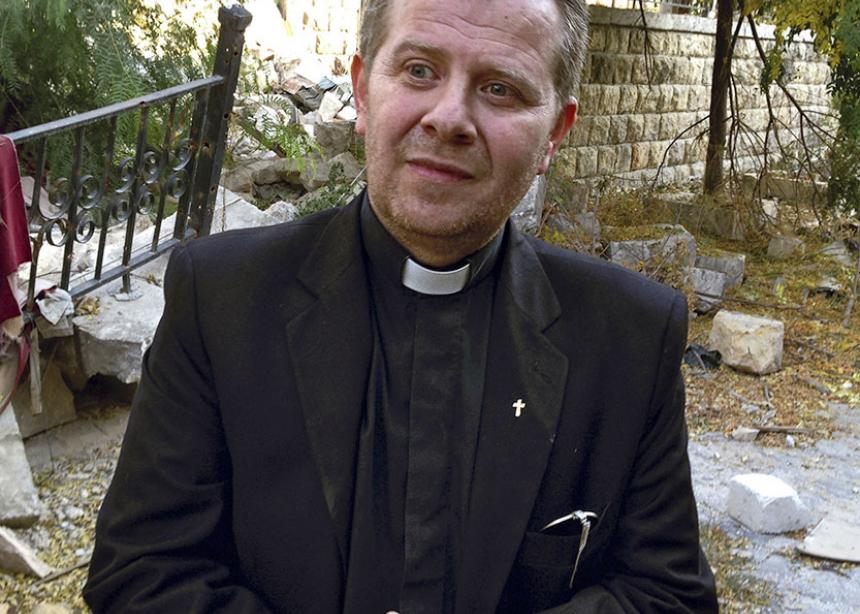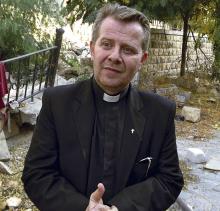In his own words, Reverend Ibrahim Nsier, a pastor of the Arab Evangelical Presbyterian Church of Aleppo, tells about his ministry in Syria. Mennonite Central Committee, through the Fellowship of Middle East Evangelical Churches, supports the work of Nsier’s church as it addresses the urgent needs of the most vulnerable.
This morning I woke up early at 4:30 to the sound of a mortar exploding. I said to myself, “A new day is started.” This is something normal in Aleppo.
I went to the kitchen, hoping to get some tea or Nescafé, but I had an urgent call from one of our members who was injured by the shelling. He needed someone to take him to the hospital. I got my shoes and got to the car quickly. Thanks to God, they dealt with his wounds very quickly, and he was in church for our service.
Today, I preached that we should use what God has given us. No one can say, “I don’t have,” because if God has given us even a tiny thing, we can do a lot with this tiny thing in this situation in this community.
The church where we worshipped before the war was bombed, so now we meet in an apartment building. It’s up five floors, almost 120 stairs. We have had mortars hit the building, but God saved us and as many as 150 of us continue to worship there.
Being a pastor in this crisis is not as much about preaching as it is being with the people in their difficult time. Even if we cannot give money or fulfill their physical needs, we can at least pray with them, at least try to comfort them.
After the service, I received another call from two older women who had not one ounce of water and had run out of money to purchase water after paying for their rent and medicine. I got my family and went looking for someone in order to get them water, which I am sorry to say costs a lot of money. We need $300 a month for a family of five for drinking and washing water.
After that, I received more calls asking me to go quickly to look for a home for two people whose houses were damaged from the mortar attacks that morning. We called a family from church that was out of town. They agreed to lend their house for a week until we can make repairs.
This day I described is like every day. Even what I have said doesn’t describe fully what is going on.
I am thankful to my wife and my family who remain with me in Aleppo during this crisis. Without my wife, I could be failing. She is my supporter.
We have three children, aged 6 to 12. This situation has forced itself over their lives. My children, when they hear a lot of bombing, they come to our room to feel a little bit secure. When we send our children to school, believe me, we say goodbye to each other because we don’t know if we’ll have the opportunity to see each other once again.
Always we teach the children that, although it is difficult in this time, our security is in God. We try to teach them that we suffer as Jesus suffered and that the day of resurrection will come someday.
We believe we have a lot left to do in this community. As I walk around the neighbourhood, I see the despair on the faces of the people. I see children on the streets begging for money. I can see people walking in the streets without shoes.
In 2013, through the church we distributed food baskets to 100 families for two months. Last summer, we were able to help 118 families with monthly cash allowances, which helps families pay for things like medical treatment, food, tuition. From August to December 2014, 65 of the most vulnerable families got monthly allowances.
We are not only supporting Christians, we are supporting the whole community to teach them that being a human means having a responsibility to the others. Believe me, we never think in ways that this is Muslim or this is Christian. We think differently. We think we are here for a message and this message should be clear for everybody—that God loves all the people and I insist on the word “all.”
We are called to live in hope. We trust God and we do our job, praying, taking care of each other, reading the Bible and being an instrument of love and peace in this community. This is what we do, and this is the hope we live in.
Please don’t forget us in your prayers.



Add new comment
Canadian Mennonite invites comments and encourages constructive discussion about our content. Actual full names (first and last) are required. Comments are moderated and may be edited. They will not appear online until approved and will be posted during business hours. Some comments may be reproduced in print.